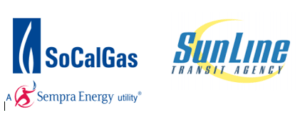The three-year demonstration research project will integrate groundbreaking technologies to
produce hydrogen for fuel cell vehicles at prices competitive with gasoline
Southern California Gas Co. (SoCalGas) announced today it will
demonstrate a groundbreaking technological combination that will produce hydrogen from renewable
natural gas (RNG) at SunLine Transit Agency’s hydrogen fueling station in Thousand Palms,
California. The research project, called “H2 SilverSTARS,” will produce renewable hydrogen to fuel
SunLine’s fleet of 17 hydrogen fuel cell electric buses and support further expansion. The combination of
new technologies will make it possible to provide renewable hydrogen made from RNG at natural gas
fueling stations—or any location near a natural gas pipeline. The goal is to produce emissions-free
renewable hydrogen for fuel cell electric cars and other vehicles at a price competitive with gasoline.
Photos and video of the SunLine buses and a diagram of the STARS technology are available here.
.
Hydrogen-powered fuel cell electric vehicles are expected to play an important role in meeting
California Governor Newsom’s executive order requiring all new cars sold in the state be zero-emissions
by 2035. As demand for these cars increases, Californians will need thousands more stations where they
can fuel up with hydrogen.
The demonstration project will integrate two core technologies. The first, Linde’s HydroPrime HC300
MIN system, will make hydrogen from renewable natural gas the same way large centralized hydrogen
Nicholas Robles
SunLine Transit Agency
(760) 343-3456 x 1621production plants do—but with compact equipment small enough to fit in a tractor trailer container.
While Linde’s system is already commercially available and being used abroad, its use at SunLine’s
fueling station will be the first time it is deployed in North America. The SunLine location will be able to
produce up to 650 kilograms of hydrogen a day.
The second technology, STARS-165 SMR, built by the start-up STARS corporation, takes the Linde system
a step further. It achieves significantly greater efficiencies in producing hydrogen by using a compact
microchannel design and is driven by an electricity-powered induction heating process, meaning there is
no combustion, which significantly reduces greenhouse gas emissions compared to traditional hydrogen
production. In addition, the system is produced using 3-D printing, making it well suited for mass-production and thus drastically less expensive to make and operate compared to alternatives. Two
STARS systems, with a combined production capacity of up to 330 kilograms of hydrogen a day, will be
installed for this research project.
The 36-month project will initially demonstrate both core technologies individually and collect
performance data to assess the STARS system’s potential to improve its efficiency and cost. The STARS
SMR technology will then be integrated with the Linde HydroPrime system with the goal of fast-tracking
its commercialization.
“These technologies could drastically change the face of hydrogen production in California, creating the
opportunity for anyone to fill up their fuel cell electric car, truck or bus with low- or zero-carbon
hydrogen anywhere there’s a natural gas pipeline,” said Neil Navin, SoCalGas vice president of clean
energy innovations. “For SoCalGas, this is another step toward meeting our pledge to achieve net zero
greenhouse gas emissions in our operations and delivery of energy by 2045.”
“Our agency has been a longtime advocate of advancing clean air and alternative fuel technology. This
partnership with SoCalGas allows us to continue converting our fleet to zero-emissions five years ahead
of state mandates,” said Lauren Skiver, SunLine Transit Agency’s CEO/General Manager and California
Hydrogen Business Council chair. “It also helps us realize our goal of making hydrogen fueling accessible
to the public in order to inspire a cleaner tomorrow.”
“I commend SunLine Transit Agency and SoCalGas for continuing to push the envelope, building on our
technological capacity for renewable hydrogen, and elevating our region’s role in driving these
innovations forward,” said California Assemblymember Eduardo Garcia (D-Coachella), Ex Officio
Member of the California Air Resources Board. “Each advancement and production efficiency brings us
closer to achieving California’s groundbreaking emission reduction, electric vehicle, and clean air goals.”
“The microchannels in this technology make the chemical reactions far faster and vastly more efficient
than traditional steam methane reformation, and it’s also far less expensive to produce,” said Robert
Wegeng, President of STARS Technology Corporation. “And because this technology uses induction
heating—which can be powered by renewable electricity—the entire process can be zero emissions
when renewable natural gas is used. We look forward to analyzing the results of this important research
alongside SoCalGas and SunLine Transit.”
“Renewable hydrogen is essential to California’s effort to reduce pollution and decarbonize the energy
we use throughout the economy, including the transportation sector,” said Bill Zobel, executive director
of the California Hydrogen Business Council. “This new technology and partnership between SunLine
and SoCalGas will play an important role in ensuring the state achieves its transportation electrification
goals and advancing zero emissions fuel accessibility to all Californians.”
SunLine Transit Agency is a national leader in providing environmentally conscious public transportation
services. The agency was a pioneer in adoption of hydrogen as a fuel and has had a hydrogen
infrastructure on-site since 2000 with the first fuel cell electric bus in operation that same year.
Recently the Agency completed the construction of a 900 kg/day hydrogen electrolyzer–the largest
renewable hydrogen-producing station in the country for transportation—creating the infrastructure
needed to maintain and grow a fleet of buses that are 100% zero-emissions. The renewable hydrogen
generated as part of this demonstration on site will be used to fuel their current fleet of 17hydrogen
buses and support further expansion.
About SoCalGas
Headquartered in Los Angeles, SoCalGas® is the largest gas distribution utility in the United States.
SoCalGas delivers affordable, reliable, clean and increasingly renewable gas service to 21.8 million
consumers across 24,000 square miles of Central and Southern California. Gas delivered through the
company’s pipelines will continue to play a key role in California’s clean energy transition—providing
electric grid reliability and supporting wind and solar energy deployment.
SoCalGas’ mission is to build the cleanest, safest and most innovative energy company in America. In
support of that mission, SoCalGas is committed to achieving net-zero greenhouse gas emissions in its
operations and delivery of energy by 2045 and to replacing 20% of its traditional natural gas supply to
core customers with renewable natural gas (RNG) by 2030. Renewable natural gas is made from waste
created by dairy farms, landfills and wastewater treatment plants. SoCalGas is also committed to
investing in its gas delivery infrastructure while keeping bills affordable for customers. Over the past five
years, the company invested nearly $7.5 billion to upgrade and modernize its pipeline system to
enhance safety and reliability. SoCalGas is a subsidiary of Sempra Energy (NYSE: SRE), an energy services
holding company based in San Diego. For more information visit socalgas.com/newsroom or connect
with SoCalGas on Twitter (@SoCalGas), Instagram (@SoCalGas) and Facebook.
About SunLine Transit Agency
SunLine provides public transit services in California’s Coachella Valley spanning 1,120 mile-service area
and carrying approximately 4.2 million riders. It has pioneered zero-emission bus deployments,
particularly for hydrogen fuel cell electric buses (FCEB). In 1993, SunLine’s Board adopted a voluntary
policy of pursuing alternative fuel solutions that provide the lowest possible emissions, which led to
SunLine becoming the first transit agency in the state to convert its entire fleet to compressed natural
gas (CNG). SunLine is committed to transitioning its entire bus fleet to zero-emission by 2035.


